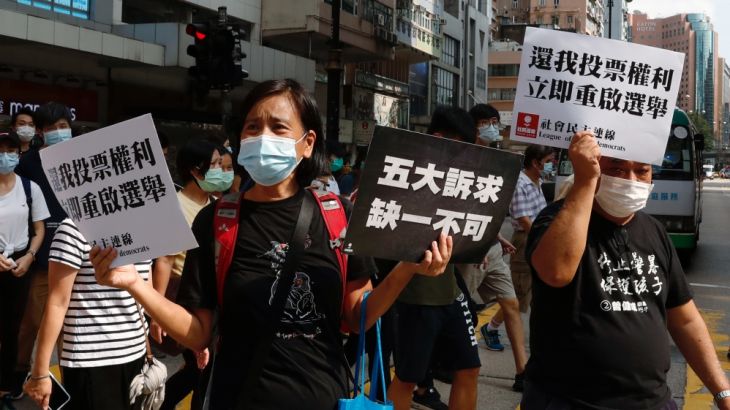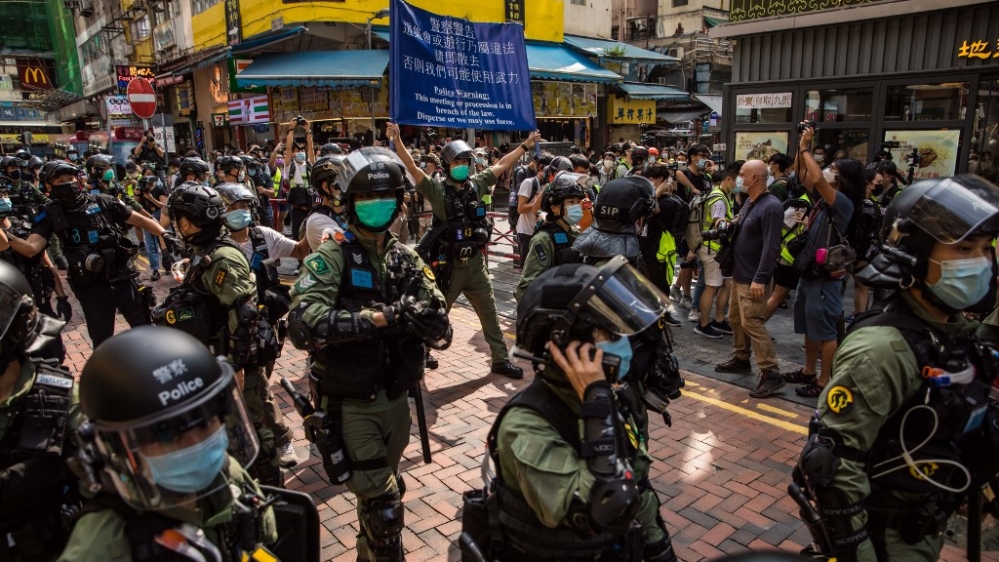Hong Kong police arrest 289 at protests over election delay
Hundreds took to streets to show their opposition to the decision to delay key elections and the new security law.

Almost 300 people were arrested in Hong Kong as police fired rounds of pepper balls and swooped on protesters who gathered to show their opposition to the decision to postpone key elections that should have been held on Sunday.
Hundreds of protesters had taken to the streets to demonstrate against the year-long delay to elections for the Legislative Council (Legco), in which the pro-democracy camp was expected to do well.
Keep reading
list of 4 itemsHong Kong’s new security law comes into force amid human rights concerns
Hong Kong passes tough new national security law
What is Article 23, Hong Kong’s new draconian national security law?
Police said that 289 people were arrested, mostly for unlawful assembly. One woman was arrested in the Kowloon district of Yau Ma Tei on charges of assault and spreading pro-independence slogans, the police department said on its Facebook page.
It said such slogans are illegal under the national security law that was imposed by China on June 30.
Sunday was meant to be voting day for the city’s partially-elected legislature, one of the few instances where Hong Kong voters get to cast ballots.
But Chief Executive Carrie Lam announced on July 31 that she was postponing the election for a year, citing a surge in cases of coronavirus. Critics say her government was worried the opposition would gain seats if voting was held as scheduled.
The poll would have been the former British colony’s first official vote since Beijing imposed the new security legislation.
Protests began in June 2019 over opposition to a proposed extradition law that would have allowed people to be sent for trial in mainland China, but evolved into broader demands for greater democracy and an end to alleged police brutality as the months wore on.
Police fire pepper balls
Thousands of police were stationed around the bustling Kowloon Peninsula on Sunday as marchers waved placards and chanted popular anti-government slogans such as, “liberate Hong Kong”.
Police fired pepper balls at protesters in Kowloon’s Mong Kong neighbourhood, the South China Morning Post newspaper reported.
“I want my right to vote,” activist Leung Kwok-hung, popularly known as Long Hair, was quoted as saying. The newspaper said Leung was later arrested.
Al Jazeera’s Adrian Brown, reporting from the city, said many people were also carrying out individual acts of defiance across the city, carrying banners or chanting slogans, in protest at the new law.
“These acts are remarkable because these individuals are doing that in the face of the sweeping national security law, which makes chants like that, saying things like that illegal,” he said.
“The demonstration was also an unconventional one as people tried hard to blend in with regular shoppers in the heart of the city, and occasionally chanted slogans or make the hand sign of the opposition.”

Limited gatherings
Anti-government demonstrations have declined this year mainly because of limits on group gatherings imposed as a result of the pandemic, and the security law that punishes actions China sees as subversive, secessionist, “terrorist” or colluding with foreign forces.
Hong Kong has reported about 4,800 coronavirus cases since January, far lower than in other large cities around the world. The number of new daily infections has fallen to single digits from triple digits in July.
While street protests have largely lost momentum, anti-government and anti-Beijing feeling persists, with China’s offer of mass coronavirus testing for Hong Kong residents prompting calls for a boycott amid public distrust.
Gatherings are currently limited to two people. Police have cited such restrictions in rejecting applications for protests in recent months, effectively preventing demonstrations.
Hong Kong returned to Chinese rule in 1997 with a guarantee of autonomy and freedoms for at least 50 years, but critics say the new law undermines that promise and puts the territory on a more authoritarian path.
Supporters of the new security law say it will bring more stability and plugs loopholes in national security because the Hong Kong administration has not passed the legislation needed under the territory’s mini-constitution.